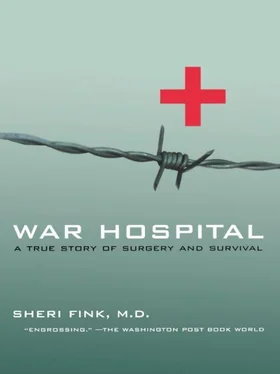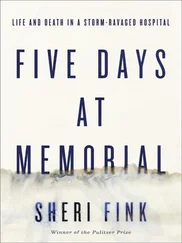Ejub, a nominal Muslim, had liked his Serb neighbors, and they had liked him. He has his own way of rationalizing why people who like each other have begun to fight. War is like a marriage squabble. Sometimes you get into an argument with your wife, and you realize, somewhere along the way, that you might have been wrong, but then it is too late to go back and admit it. You keep on fighting. In war, there are times you wish there weren’t a quarrel and that you could go back to the beginning, but you can’t because blood has been spilled and, almost by natural law, it goes on and on and you have to defend yourself. That is how he makes sense of it, if any sense can be made of it at all.
He reaches his orange brick apartment building and enters the door on the west side. He goes to sleep in his marriage bed. Like every night for three months since the fighting started, no matter where he sleeps or for how long, he dreams about the wife and son he sent away for safety.
He awakens gripped with the fear of death and the certainty that he will be killed before seeing them again. Perhaps sleep is where the operating room images develop, where gruesome photos from the surgeries he’s done stack up. He lies in bed and prays for a replacement to come.
* * *
FOR DIFFERENT REASONS, the commanders of the ad hoc troops defending the territory around Srebrenica also want a qualified surgeon to take over the makeshift operating theater. Medicine is a war weapon. The presence of six doctors on six islands of land around Srebrenica has correlated with their successful defense.
Now that the islands have been connected, five of the six doctors have come together in a central place, forming the Srebrenica war hospital and temporarily boosting morale among soldiers and civilians. Amputations take place in the hospital room rather than on the kitchen tables or living room floors of village houses where they did the first three months of war.
For a while, just knowing that a doctor stands behind them has kept up the defenders’ morale. But in many ways, medical care is still in the Middle Ages. A head, chest, or stomach wound means near-certain death. As more soldiers realize this and lose the will to fight, their commanders believe, there is more of a chance that Serb forces will succeed in expelling the Muslims from their land, “ethnic cleansing.”
The nearest big city controlled by Bosnian government forces—Tuzla—lies only fifty miles away but a world apart, inaccessible beyond miles of enemy territory and minefields. With no working telephones, making a link with that outside world means finding the man who used to run the amateur radio club and outfitting one of his ham radios with a car battery.
When the amateur radio operator makes a connection, he speaks slowly and clearly:
“In Srebrenica, we are running out of medical supplies.”
“We are in desperate need of a surgeon here.”
“People are dying of injuries that could be treated.”
The people who hear these words pass them on to Bosnian radio, where the message is broadcast into the homes of Bosnia’s biggest cities, where it sticks in the memory of a self-styled war surgeon named Dr. Nedret Mujkanović.
The radio operator’s plea also makes its way into the ears of local translators who work for the United Nations in the Bosnian capital, who tell their international bosses about the situation, who pass the information to other aid workers, who pass the word to a particularly strongwilled Belgian doctor named Eric Dachy, who works for an aid group called Doctors Without Borders.
FOR DR. ERIC DACHY, Srebrenica sounds like salvation. By the summer of 1992, the thirty-year-old Belgian generalist has arrived upon some of the most brutal scenes of the wars of Yugoslavia’s dissolution, but always after the fact, when nothing is left to do but offer succor to the survivors. The fact that an island of non-Serbs is holding out in eastern Bosnia means there is still a place to intervene before the worst occurs.
Over his past eight months as regional director of Doctors Without Borders, Eric has come to be considered, by dull U.N. functionaries and the few unenthusiastic aid workers in Belgrade, Serbia, the capital of what remains of Yugoslavia, as “our best example of local color.” With his keen mind, unorthodox appearance, and steady-burning pilot flame of outrage at injustice, Eric has made his mark. When he strides into coordination meetings chronically late in his black leather jacket, uncut brown hair stuffed back in a ponytail, looking as if he’s been up all night, the others can almost hear a Harley-Davidson roaring behind him. But his teen rebel appearance belies a mature sensibility.
Eric doesn’t need the meetings, the others agree. The meetings need him. He seems to grasp what it is taking others, even those older and more experienced at this work, much longer to figure out. For one thing, they aren’t in the tropics. The malaria pills the aid workers dump here are a useless source of medical waste. This population, older and with more chronic diseases than most recent refugee populations, needs its blood pressure pills, diabetes medications, and dialysis fluids. If the agencies are serious about restoring dignity to these refugees, they need to start providing soap, toothpaste, shampoo, and other items for personal hygiene, regardless of the fact that aid workers in poorer countries have to fight for enough syringes to immunize children.
But even this doesn’t seem to be enough anymore in light of the horrors Eric has witnessed. Increasingly, he challenges his colleagues with the idea that the real issue isn’t how to provide humanitarian aid, but how to stop the war. The nightmares he has seen these past months have made him question everything—the value of life, the principles that can be defended here, and the impact of his presence as a humanitarian aid worker. He searches for a corner of this war where what he can provide will be truly needed.
Sometimes he wonders how the hell he landed in this violent place and why the hell he stays here. Religion, which motivates so many others who go out in the world to “help,” has nothing to do with it. In fact, Eric’s upper-middle-class parents in Brussels, Belgium, raised him as an atheist in the predominantly Roman Catholic country. On the one hand, atheism has led him to take a rational approach to the world rather than a moralistic one. On the other hand, Eric’s father, a lawyer whom he loved and revered, instilled in him a hunger for justice.
Eric isn’t a stranger to conflict. Angry voices echoed through his childhood home. Growing up in the tumultuous 1960s with two older siblings acting out their adolescent rebellions, well-behaved and highachieving Eric didn’t draw too much attention from his parents. Family quarrels helped Eric hone his skills in argumentation and critical thinking and heightened his desire for justice, but he hated the fights and hated the splintering relationships between people he loved. Fed up, he left home at age seventeen to attend college and live with a girlfriend. He harbored dreams of putting everyone back together again, giving each of them what they deserved to make them happy, stop blaming one other, and be friends again. A half year later, on Eric’s eighteenth birthday, his father died suddenly. Eric’s plan to mend the family went into hibernation.
Eric struggled through medical school and then opened a general practice in his suburban Brussels apartment, but found his work less than stimulating. He dawdled through the post-graduate training needed for full physician certification, dabbled in learning psychoanalysis, and filled out his nights and his gut at Brussels bars.
What captivated him in the late 1980s was news of the changing international order. When the Berlin Wall fell, symbolizing an end to the conflict between east and west, he expected world peace to break out. Instead came the 1991 Gulf War. He wasn’t a pacifist, but he opposed it, believing that Iraqi leader Saddam Hussein’s foray into Kuwait could be stopped by other means.
Читать дальше












